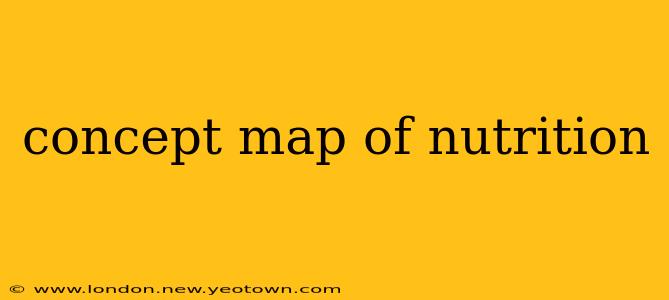Have you ever looked at a plate of food and wondered about the intricate science behind nourishing your body? Nutrition is more than just eating; it's a complex interplay of nutrients that fuel our cells, build our tissues, and keep us thriving. This journey will unravel the concept map of nutrition, revealing the interconnectedness of various components and answering some frequently asked questions along the way.
What are the main components of a healthy diet?
This is the cornerstone of understanding nutrition. A healthy diet isn't about restrictive diets or fad trends; it's about balance. We're talking about the macronutrients and micronutrients that work together like a well-oiled machine.
Macronutrients: The Big Three
Think of macronutrients as the heavy lifters – the building blocks that provide energy and structure to our bodies. They are:
-
Carbohydrates: Our primary source of energy. They break down into glucose, fueling our muscles, brain, and other organs. Choose complex carbs like whole grains, fruits, and vegetables over refined carbs like white bread and sugary drinks.
-
Proteins: Essential for building and repairing tissues, making enzymes and hormones. Complete proteins (found in meat, poultry, fish, eggs, and dairy) contain all nine essential amino acids our bodies can't produce. Incomplete proteins (found in plant sources like beans and lentils) need to be combined to provide all essential amino acids.
-
Fats: Often misunderstood, healthy fats are vital for hormone production, cell function, and nutrient absorption. Unsaturated fats (found in avocados, nuts, seeds, and olive oil) are beneficial, while saturated and trans fats (found in processed foods and some animal products) should be limited.
Micronutrients: The Unsung Heroes
These nutrients are needed in smaller amounts but are equally crucial for various bodily functions. They include:
-
Vitamins: Organic compounds that play a role in many metabolic processes. There are fat-soluble vitamins (A, D, E, and K) and water-soluble vitamins (B vitamins and C).
-
Minerals: Inorganic elements essential for bone health, nerve function, and fluid balance. Examples include calcium, iron, zinc, and potassium.
-
Water: Often overlooked, water is crucial for transporting nutrients, regulating body temperature, and eliminating waste.
What is the difference between essential and non-essential nutrients?
Essential nutrients are those our bodies cannot produce or produce in sufficient amounts, so we must obtain them through our diet. Non-essential nutrients, on the other hand, can be synthesized by our bodies. However, even non-essential nutrients are important and play crucial roles in maintaining health. A balanced diet provides both.
How many calories should I eat per day?
Calorie needs vary significantly based on age, sex, activity level, and overall health. There isn't a one-size-fits-all answer. Consulting a registered dietitian or using online calorie calculators (keeping in mind they provide estimates) can help you determine your individual caloric needs. Focus on a balanced intake of macronutrients rather than solely focusing on calorie restriction.
What are some common nutritional deficiencies?
Nutritional deficiencies can arise from inadequate intake, impaired absorption, or increased nutrient needs. Some common deficiencies include:
- Iron deficiency anemia: Caused by insufficient iron, leading to fatigue and weakness.
- Vitamin D deficiency: Can weaken bones and increase the risk of fractures.
- Calcium deficiency: Also contributes to weak bones and increased risk of osteoporosis.
- Vitamin B12 deficiency: More common in vegans and vegetarians, leading to anemia and neurological problems.
How can I improve my nutrition?
Improving your nutrition is a gradual process, not a drastic overhaul. Start with small, sustainable changes:
- Increase fruit and vegetable intake: Aim for a variety of colorful produce.
- Choose whole grains over refined grains: Opt for brown rice, quinoa, and whole-wheat bread.
- Incorporate lean protein sources: Include fish, poultry, beans, lentils, and tofu.
- Limit processed foods, sugary drinks, and unhealthy fats: Read food labels carefully.
- Stay hydrated: Drink plenty of water throughout the day.
- Consult a registered dietitian: They can create a personalized plan based on your individual needs and health goals.
This concept map of nutrition offers a glimpse into the intricate world of food and its impact on our well-being. Remember that nutrition is a journey, not a destination. By making informed choices and prioritizing a balanced diet, you'll pave the way for a healthier and more vibrant life.

